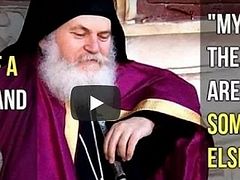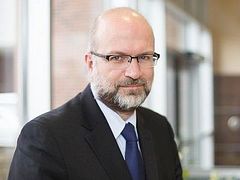I know a man who went on a ghost tour, claimed to have seen a “ghost”, and in the same breath told me that he doesn’t believe in ghosts. I know another man who, aware that tornadoes are relatively rare in Germany, refused to believe that I saw a funnel cloud forming over the North German countryside even after I showed him photographic evidence.
As I recall, neither person explained his disbelief by pointing to another, more convincing theory by which he was persuaded. If the second person based his disbelief on the fact that he couldn’t verify the cloud’s rotation (since a photograph might not easily capture that motion), along with the simple fact that clouds take on innumerable shapes, some merely resembling funnel clouds, then I’d respect—however grudgingly—his skepticism.
No, what underlay each person’s disbelief was a stubborn refusal to believe anything that defied his expectations or understanding. We all know that it’s a problem to see something that isn’t there, but we seem far less conscious of the fact that it’s also psychologically troubling to deny seeing something that is.
It was, in part, my encounter with such people that led me to abandon my long-held assumption that everyone desired the truth. “No one chooses to be ignorant,” I thought to myself. On the contrary, I eventually came to believe that some people are actually quite content to build their lives and identities on falsehood. At some level of consciousness, they choose their pet paradigms over disconfirming truths; they are too weak to admit that they were wrong; too proud to be surprised.
For my part, I never dismissed extraordinary claims on principle. I never thought that I had, or could ever have, enough information about reality to do so, no matter how ridiculous those claims seemed. I don't believe in fairies, but if you were to tell me that you had a fairy friend living in your garden, I would be willing to temporarily suspend my disbelief and investigate your claim. True, I'm more than likely to conclude that you've been either lying or are simply crazy, but you can be certain that I would investigate. In short, I would be open-minded. (I say this not to boast. As far as I can tell, my open-mindedness is the result of processes in which I was only passively involved, not of some virtuous decision on my end. In any event, I don’t suggest that open-mindedness always yields positive outcomes. I wouldn’t complain if my children remained “close-minded” on whether doing drugs is as harmful as I’ve made it out to be.)
When I was first exposed to the Christian faith, I was introduced to a belief system replete with claims of extraordinary events. But that didn’t deter me from investigating it. True, science cannot account for, say, the Virgin Birth or the Resurrection. But does this necessarily mean that these events did not or cannot occur (click here for my piece on the Virgin Birth and miracles, in general)? The discipline of science is defined by a particular method used to acquire knowledge. To say that something is “scientifically impossible” is merely to say that it is methodologically impossible; not that something has been disproven, but that it can’t be proven through methods proper to that discipline. But scientific impossibility doesn’t mean phenomenological impossibility; if we were to unwittingly equate the two, then we must also be prepared to say that the burning of Sardis – along with countless other historical events – never occurred.
I thus acknowledged the epistemological limits of science. I knew the difference between science and scienticism. That is, whereas scientists tell us about what happens to be observed, believers of scienticism purport to tell us what can or cannot be observed. In doing so, they venture beyond science and enter (clumsily) into the realm of philosophy.
The scientifically baseless assumption that there can be no deviations from what is normally observed in nature is so deeply engrained in many intellectual circles that otherwise bright people will advance arguments that seem to them unassailable, but sound unduly speculative to the ears of the more open-minded. Here’s how the late New Testament scholar, Marcus Borg, justified his “misgivings” about accepting the orthodox claim that Jesus saw himself as the Messiah: “If you think you are the light of the world, you are not. That is, perceiving oneself in such grand terms is a fairly good indicator that you’re off base.” Evidently, Borg took for granted the unjustified proposition that there could never be an incarnate light of the world, in whose case it would only be honest – not narcissistic or delusional—to disclose such a grand self-perception. This is what passes for scholarship these days. Scholars like Reza Aslan have reconstructed Christ’s entire earthly life within these materialist parameters. Why do their works attract far less criticism than is warranted, when their arguments rest so transparently on unfounded assumptions? There are multiple reasons, but I’ll limit myself to one possibility: some would-be critics are reluctant to draw attention to this conspicuous problem for fear of being outed as “naïve”, “superstitious”, “anti-intellectual”, or some other epithet for non-materialist. (It’s somewhat like the ongoing problem of porn spam, which arguably persists, in part, because many are afraid that openly complaining about receiving such unsolicited content will be viewed—unreasonably, I’ve read—as evidence that they’ve been downloading pornographic material. I don’t suggest that this is a perfect analogy, of course; I’ll leave it to the reader to decide on whether it’s just as embarrassing, according to today’s standards, to be exposed as a supernaturalist as it is as a viewer of pornography.) In other words, it takes some courage to question the materialist assumptions that undergird socially respectable thought.
Don’t get me wrong: I understand that the faithful have their share of close-minded people. I would simply suggest that, at a minimum, they don’t have a monopoly on close-mindedness. Recent scholarly research bolsters this claim. Here’s how the lead author of a 2017 peer-reviewed study explained his findings: “Closed-mindedness (or at least some aspects of it) may not be reserved only for the religious. Moreover, in some aspects, the nonreligious may even ‘outperform’ the religious.”
As should be clear, this essay wasn’t meant to provide validation for the Christian faith (Those who wish to examine the evidence might consult the highly readable books of Lee Stroebel, especially The Case for Christ, or, to cite works from my own Orthodox tradition, Jeannie Constantinou’s contributions to my edited book, Re-Introducing Christianity: An Eastern Apologia for a Western Audience.) My more modest objective was to justify investigating it with a truly open mind. My hope is that readers will renounce the mental shackles that restrain contemporary thinking, so that they’ll be free to believe or disbelieve in Christianity based on the evidence or lack thereof, and not be predetermined to disbelieve by scientifically unsupportable, a priori assumptions about what is possible.
Amir Azarvan is an Assistant Professor of Political Science at Georgia Gwinnett College.





